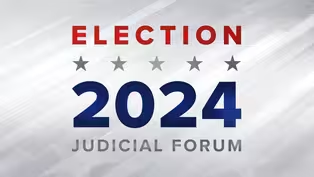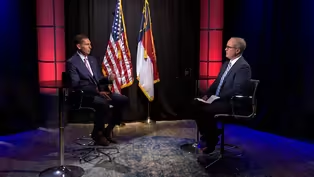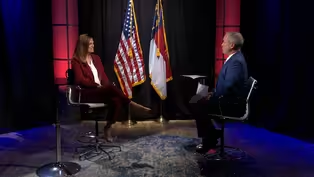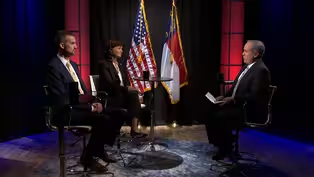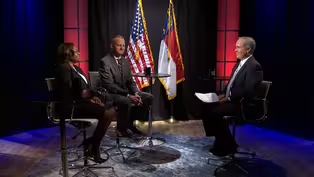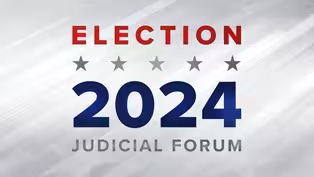
NC Court of Appeals Seat 15: Chris Freeman (R) & Martin Moore (D)
Season 2024 Episode 5 | 12m 59sVideo has Closed Captions
NC Court of Appeals seat 15 candidates Chris Freeman (R) & Martin Moore (D) discuss the position.
Candidates Chris Freeman (Republican) and Martin Moore (Democrat) discuss their background and why they're running for NC's Court of Appeals seat 15 with PBS NC's Kelly McCullen. These interviews are a partnership with the NC Bar Association.
Problems playing video? | Closed Captioning Feedback
Problems playing video? | Closed Captioning Feedback
Election is a local public television program presented by PBS NC
The 2024 Judicial Candidates Forum is made possible by a partnership between PBS North Carolina and the North Carolina Bar Association.

NC Court of Appeals Seat 15: Chris Freeman (R) & Martin Moore (D)
Season 2024 Episode 5 | 12m 59sVideo has Closed Captions
Candidates Chris Freeman (Republican) and Martin Moore (Democrat) discuss their background and why they're running for NC's Court of Appeals seat 15 with PBS NC's Kelly McCullen. These interviews are a partnership with the NC Bar Association.
Problems playing video? | Closed Captioning Feedback
How to Watch Election
Election is available to stream on pbs.org and the free PBS App, available on iPhone, Apple TV, Android TV, Android smartphones, Amazon Fire TV, Amazon Fire Tablet, Roku, Samsung Smart TV, and Vizio.
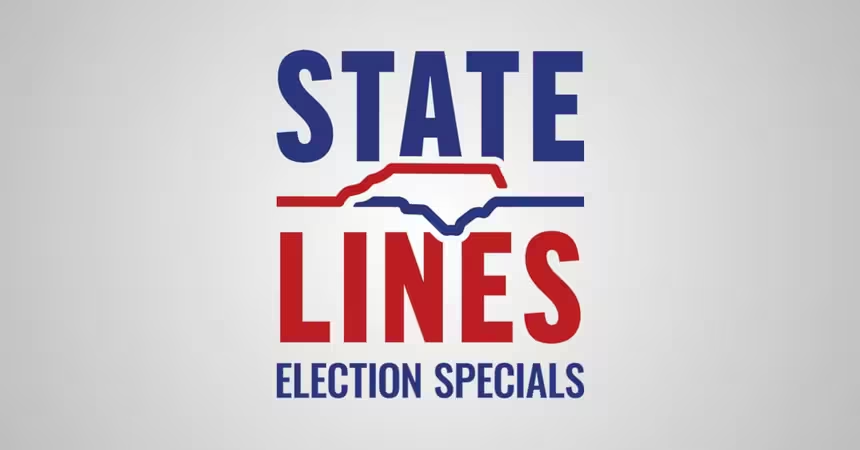
Council of State Candidate Interviews
During major election cycles, State Lines host Kelly McCullen sits down for in-depth conversations with candidates running for Governor and Council of State positions.Providing Support for PBS.org
Learn Moreabout PBS online sponsorshipMore from This Collection
2024 NC Judicial Forum
2024 NC Court of Appeals Seat 15 & Supreme Court Seat Candidates
Video has Closed Captions
St. 15: Chris Freeman (R) & Martin Moore (D). Supreme C.: Jefferson Griffin (R) & Allison Riggs (D). (26m 46s)
NC Supreme Court Candidate Jefferson Griffin (R)
Video has Closed Captions
NC Supreme Court candidate Jefferson Griffin (R) discusses the position. (6m 43s)
NC Supreme Court Candidate Allison Riggs (D)
Video has Closed Captions
NC Supreme Court candidate Allison Riggs (D) discusses the position. (6m 41s)
NC Court of Appeals Seat 14: Ed Eldred (D) & Valerie Zachary (R)
Video has Closed Captions
NC Court of Appeals seat 14 candidates Ed Eldred (D) & Valerie Zachary (R) discuss the position. (12m 20s)
NC Court of Appeals Seat 12: Tom Murry (R) & Carolyn J. Thompson (D)
Video has Closed Captions
NC Court of Appeals seat 12 candidates Tom Murry (R) & Carolyn J. Thompson (D) discuss the position. (12m 56s)
2024 NC Court of Appeals Seats 12 & 14 Candidates
Video has Closed Captions
Seat 12: Thomas Murry (R) & Carolyn J. Thompson (D). Seat 14: Ed Eldred (D) & Valerie Zachary (R). (26m 46s)
Providing Support for PBS.org
Learn Moreabout PBS online sponsorship[bright music] - [Announcer] The 2024 Judicial Candidates Forum is made possible by a partnership between PBS North Carolina and the North Carolina Bar Association.
Hello again, thank you for joining us, because joining me here on the set, the nominees for North Carolina's Court of Appeals, seat number 15, Democratic candidate, Martin Moore and Republican candidate, Chris Freeman are here.
Gentlemen, thank you so much for your time and sharing your insights with not only me, but with our viewers out there across North Carolina.
- You're welcome.
- Thank you for having us.
- Now, we flipped a coin backstage to see who would start with an opening statement.
This is not a debate, but it will have an opening and closing remarks.
And by virtue of the coin flip, you have the first two-minute introductory speech directly to the voters or to myself, Mr. Moore.
- Thank you, Kelly, and thank you to the North Carolina Bar Association for hosting this forum.
My name's Martin Moore, and I'm running for seat 15 on the North Carolina Court of Appeals.
I'm running for this seat, because I believe that we need qualified, diverse voices serving on our bench if we wanna uphold our duty to assure equal justice for everyone under the law.
I began my career as a public defender, fighting for just outcomes for every person, regardless of how much money they had in their pocket.
In private practice, I moved on, working on complex civil matters and everywhere from state court cases to federal court cases, as well as cases before the North Carolina Supreme Court and North Carolina Court of Appeals.
And now I have my own law firm where I do appellate work and mediation work and currently serve as a Buncombe County commissioner.
Now, in this role, I've learned a lot about what's facing people in their everyday lives, but more and more, the answer comes back to the Court of Appeals.
When people talk to me about everyday issues, things that come up for us on Buncombe County Commission, for example, school funding and what our education system looks like, a lot of these questions are coming back to the Court of Appeals and the Supreme Court.
When we're talking about gerrymandering and when we're talking about reproductive rights and healthcare, all of these come back to the Court of Appeals, and I think that we need qualified voices who are willing to stand up to extremism, apply the Constitution and protect equal rights for every person in the state of North Carolina.
So I'm excited to be here with you all today and share with you a little bit about my vision of what it means to uphold the law, fight for equal justice for everyone, and make sure that we have a court that is committed to upholding the Constitution.
- Chris Freeman, your two minutes.
- All right, good afternoon, Kelly.
It's absolutely wonderful to be here.
I appreciate you, the North Carolina Bar Association, and PBS for doing this.
And you and these voters out here in North Carolina are probably looking at me like, "We recognize this guy."
There's a reason for that, sir.
I was in the movie "Talladega Nights" as an extra, so there's lots of people across state know who that is.
But more importantly, I was born here in North Carolina, raised here in North Carolina, grew up in a small town called Denton, North Carolina.
Went to Asheville High School, home of the Blue Comets, from there to High Point University.
Once I graduated, it was not quite the resort it is today, from there to Regent University where the motto is, "Christian leadership to change the world."
Now I was blessed to be in private practice for just a short amount of time, then went to work as an assistant DA in Rockingham County, and I spent eight years there trying cases before juries, before judges.
I worked with victims, I worked with law enforcement, and I worked with everyone in the court system.
I saw how the court worked.
Now in 2014, I decided to run for judge against an incumbent, and I was successful in that run for judge.
And when I was sworn in in 2015, I've been a district court judge ever since.
I've not been opposed.
I'm in my third term, ninth year.
And in that court, in that capacity, I've had the honor of serving in all the courts inside the court system, whether it's criminal or civil.
And 2013, at the age of 35, I joined the US Air Force and went in as a JAG Reserve officer.
I make rank to major next month.
In that capacity, I've served the citizens of the entire United States in a legal capacity.
When I go to base, I'm in a legal office, I do civil stuff, I write legal reviews, I do wills, part of court cases, and just a diverse experience that I've had the opportunity to do.
And I'm thankful for God for blessing my life and giving me the opportunity.
I've had much prayer for me, and it's an honor to be running for North Carolina Court of Appeals.
I feel like I have the experience needed.
And I am a judge, if you look back at my track record, who will stay in my lane.
I will not legislate from the bench.
I follow the law as it is, and I uphold and defend the Constitution.
And I've taken that oath no less than six times as an assistant DA, a judge, and an officer in the military.
- All right, Mr. Moore, if you had to name the most important qualification of any judge, set aside their political party, those qualifications that make a great Court of Appeals judge, what are they in your estimation?
- If I had to start, I'd say experience doing the work.
A big part of what's interesting about the Court of Appeals is that it's a very unique skillset.
You're not appearing in the trial level, have plenty of trial experience, but it's an error-correcting court.
But that requires experience, not just appearing in the courtrooms or hearing the trial court matters, but making sound, cogent arguments at the appellate level, understanding what's going to move those three-judge panels when they're making the decisions about what the Constitution looks like and having a broad overview of what it means to practice in any setting.
You're not just looking at criminal cases, you're not just looking at civil cases, it can be anything under the sun when you're on the Court of Appeals.
So having that experience serving as an appellate attorney before the North Carolina Court of Appeals and North Carolina Supreme Court is an extremely beneficial asset that I hope to bring to the bench, and knowing not just what it means to serve on that bench, but looking at it from the perspective of an appellate advocate and someone who has appeared in those courtrooms in that capacity before.
- Mr. Freeman, I'll ask you the same question 'cause there might be subtle differences.
We are in a partisan race after all, in this day and age.
Important qualifications as you look at that Court of Appeals, what skills need to be there, what sentiments?
- Yes sir, I agree with Mr. Moore here that as a sitting judge, the experience is what matters when you're going to the appellate level.
I've been a judge for almost 10 years.
At the end of this year, it will be 10 years.
I've made important, hard decisions from a judge's perspective for three terms.
And as a prosecutor, I made the same kind of decisions for eight years, so that's almost 18 years.
When I'm making decisions for command in the military, it's the same thing.
There's an expectation that you'll know the law, you'll follow the law, and you'll treat all those who come before you fairly and impartially with respect and dignity, inside and outside of the court.
I've gained the trust of the voters in Rockingham Castle County.
They voted me in three terms.
Prior to that, I was a prosecutor.
And I feel like that's because they know that they got somebody that knows the law, that'll go there and make these difficult decisions while basing it on the law and the Constitution, giving people confidence in the court system, that it's all based on the law, upholding the law, and following the Constitution, not legislating from the bench.
- Of all that experience you've got, what particular skills have you learned over the years?
And whether it's in the military or in civilian court, I guess is what you would call it, what would you pull out of that to go, "That's what I learned "when I was considering running for Court of Appeals.
"That's what I'll bring."
- Yes, sir.
Well, that's a good question, sir.
Listening to people, letting 'em have their day in court, treating them with fairness and respect, whether they come to you from a jail uniform, or they come in the fanciest suit, letting them know that no matter if they represent themselves pro se or they have the finest lawyer, that they're gonna be treated fairly with dignity, with respect, with fairness and impartiality, but more importantly, that the judge knows the law, follows the law as it is, no matter who comes before them.
- Mr. Moore, public defender, you've got private practice experience, Buncombe County Commissioner.
Dive into all those experiences.
Which few do you bring out as being exemplary, great examples of your leadership and why it best qualifies you for Court of Appeals.
- Absolutely, well, I think a common thread across all of those ends up being transparency and integrity, being willing to put on the line, because a lot of times you'll hear the same words come up in the court system, equality, equal justice, what does it mean to get the right outcome?
And I think that's gonna be where you see a lot of difference between judges, people who are willing to share what their values are and be able to state what fairness and justice looks like to them, what that dignity and respect looks like when we're having people from any background step into our court system.
As a public defender, that meant showing up and fighting for those who didn't have any money in their pocket.
But I also believe that justice has no zip code.
I think that we have to make sure that everybody's treated fairly and not just talk about that in an abstract sense, but be aware of what challenges people face, and understand how our system works at every level, both in civil courts, what the barriers are to equal justice and what the barriers are and making sure that everyday people feel respected in that courtroom.
And as a Buncombe County commissioner, I've seen firsthand the challenges that the everyday person faces when they get a Court of Appeals decision.
Most of us aren't reading these for fun on the weekends, so you're looking at folks who often don't understand why the system is the way that it is, but are being forced to navigate that.
So I think having that policy experience as a commissioner and also having that appellate experience of having been an attorney in those courtrooms has counted for a lot and will count for a lot on the bench.
- I wanna squeeze in one last question, about a 30 second answer needed here, about the independence of the judiciary.
People vote for parties, and they'll see a party affiliation beside each of you.
How important is it to be independent, or should voters look at party affiliation when determining a judge, even on the Court of Appeals, which is a very technical court?
- My question.
- Your question.
- All right, so I have a a unique perspective on that.
When I ran for judge the first time in 2014, it was nonpartisan, so I worked very hard.
I had one county, not 100 counties as I do now.
But the first question, when you go out and you're working boots on the ground, talking to people and knocking on doors, they wanna know what your party affiliation is.
The voters deserve to be educated.
They need to know.
And that's not where they stop at.
They look at your background.
They look at what your knowledge of the law, they look at your experience.
But it's not up to us judges to make the rules for how elections work.
The rules are put in place by our constitution and other branches of government, but we, as judges, follow the law as it is.
And now, the way it is, it's partisan, but we're supposed to be fair, and I can tell you, it never comes into the courtroom.
I don't know what party somebody is when they're before me.
I never ask, don't wanna know.
They're all treated the same based on the law and the evidence.
- What should voters expect of you, Mr. Moore, running under a party affiliation, but yet judges are deemed independent in so many ways, if not all ways.
- I think the folks expect the judiciary to be independent and free from that bias or extremism or any kind of political decision making.
One of the biggest things that's important to me is that integrity and transparency again, of making sure that people know that when I'm making my decisions, it's not going to be based on party or serving as a rubber stamp for friends of the legislature, it's going to be about making the decisions about the case before me and having that track record of knowing I'm going to fight for the just outcomes, and I'm gonna assure just outcomes regardless of political party.
And I think that comes down to transparency and being clear about what's motivating you.
- All right, gentlemen, that concludes my questions.
We do have about a minute for each of you to give a concluding argument directly to the voters of North Carolina.
Tell 'em about your campaign, while you're seeking this office.
- I'm seeking this office, because I know it's going to take a qualified, diverse set of perspectives to have a functioning, high-quality Court of Appeals.
It's going to mean having a Court of Appeals full of judges who have that background of knowing what it means to advocate in those courtrooms and understand and appreciate there is no place for partisan politics or extremism in our court system.
With me, I'm sharing with people, I'm committed to equal justice under the law, and I want everyone to know that they're going to have a jurist who is willing to hear the facts of their case and is going to stand up for the rights of all people under the North Carolina Constitution and committed to a system that does not put partisanship over individual rights and constitutional law.
- That's Martin Moore, Democratic nominee for Court of Appeals, will be seat 15 on your ballot.
Mr. Freeman, the last minute is all yours by virtue of the coin flip, concluding argument, sir.
- Thank you, Kelly.
It's an honor to be in this position, to be your Republican candidate for North Carolina Court of Appeals.
I'll admire my colleague here.
Long ago, I started as a prosecutor.
I did that for eight years.
Then I was elected to a district court judge.
I've almost done that for almost 10 years.
Service in the military, almost 11 years.
I have a servant's heart.
I wanna serve my state.
I wanna serve my country, and I have done so.
And I think that's what the voters expect when you get to the high level of Court of Appeals.
You need the experience.
You need the knowledge.
You need to know what it's like to have those things.
I've been endorsed by the Fraternal Order of Police and the Police Benevolence Association.
Those folks have seen my track record, how I've been in the courtroom, not only as a prosecutor, but as a judge.
They don't know so much about my military, but I'm serving and I've told you I'm making the rank to major next month.
It's a big deal.
It takes a lot to do these courts.
There's only 15 judges.
We wanna make sure with panels of three, we get it right, and it's an honor to serve.
And I can't stop without thanking the voters in North Carolina.
I had to win a primary.
I had to win against the other Republican.
And with their help and with their votes, I won 90 of 100 counties, that's huge.
And I just hope that I can get their support moving forward.
And my website is ChrisFreemanforjudge.com, thank you.
[bright music] - Thank you gentlemen, and thank you for watching.
- [Announcer] The 2024 Judicial Candidates Forum is made possible by a partnership between PBS North Carolina and the North Carolina Bar Association.

- News and Public Affairs

Top journalists deliver compelling original analysis of the hour's headlines.

- News and Public Affairs

FRONTLINE is investigative journalism that questions, explains and changes our world.












Support for PBS provided by:
Election is a local public television program presented by PBS NC
The 2024 Judicial Candidates Forum is made possible by a partnership between PBS North Carolina and the North Carolina Bar Association.
